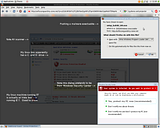Preparedness
Coleman gear
public key crypto
homebrewing
Ford Ranger
KF5RCA
Team Mousetrap
I recommend...

Get Linux!


GnuPG



Yes, admittedly linux was a bit of a beast in the past. In the 90s you had to be a major geek to get it running usefully. But things have changed for the better: it's trivial to test-drive a linux flavor and see if you like it. No install necessary, no changes to your existing system. And no charge. Don't like linux? Unplug the flash drive (or pop out the cd) and reboot. No harm, no foul.
And it's not like Linux is exotic or geeks-only anymore. It's friendly and
can be quite
pretty to look at. Let's compare it to Firefox
again. Many of you have used firefox: some switch to it exclusively,
some go back-and-forth between IE and Firefox, and some only use IE.
Do you like having fewer virus issues with firefox? Do you like
being able to install plug-ins and add-ons to make Firefox do
what you want rather than what some marketer or programmer
wants? Did you like having tabs 2 yrs before IE users? Do you think Portable
Firefox is a neat idea? Do you like being able to uninstall firefox
later if you don't like it? Do you lose sleep at night because there is
no phone number at a Big Company to call when you have questions about
Firefox, or do you google it to see what people are saying, or look for an update?
Same with linux.

Linux gives you the freedom to do what you want with your
computers, free of MS viruses, free of "Genuine Advantage" propaganda,
free of costly upgrades, free of Blue Screen of Death. Click the
thumbnail at right to see a typical malware site do its best to infect
a linux box.
Firefox was the proof-of-concept that free, open-source software
can be useful and easy for the interested consumer.
One benefit of installing linux on the desktop is you typically have a lot of diskspace to work with. If you want to, for example, install both Gnome and KDE you can choose to do it. Do things like that and your linux installation might bloat up to, say, 1/3rd the size of Windows 7. Gettin' heavy!
Linux - Technically, GNU/Linux. Linux proper just means the kernel.
kernel If operating systems were cars, the kernel would be the engine.
GNU utilities The tools and utilities built around the kernel to make it a useful. To continue the car metaphor, this is the body/chassis.
distro / distribution a particular linux "flavor". Since linux is re-distributable and hackable, there are many variants.
box - a particular machine. "That box in the corner", or "my Debian box".
.iso - a cd/dvd image.
source / source code - the actual programming code used to make the software. "Use the source, Luke!"
window manager - If you are running a GUI (pretty pictures with a mouse) this is the part of the operating system you see; what it looks like when it boots up before you start running programs. In our car metaphor, the window manager (by itself or bundled in a desktop environment (below) is the cockpit, the part of the car you sit in and touch: steering wheel, pedals, seats, windshield, radio, etc. (there is more and less to it than that but this is a useful simplification that will get you going). You can have many different WM or just the one you like. Insanely customizable with things like virtual desktops, custom menus, layouts, backgrounds, whatever. Be aware there is a continuum and generally pretty/fancy is on one end and efficient/fast is on the other.
Famous WM include
Window Maker,
blackbox-openbox-fluxbox,
IceWM, etc.
The 'box'-named WMs above are clean to the point of being completely blank at first glance. This can be disorienting for new users but power users seem to like them.
Please read the entry on Desktop Environments below.
desktop environment - One of the historical strengths (or limitations, depending on your outlook) of a WM is its agnosticism about what programs look like. A WM doesn't care. This gives the opportunity for more of the program's personality to shine through but may result in a visual mishmash of styles on the desktop. Desktop Environments address that issue by providing a consistent appearance (at the cost of bloat and perhaps performance). Basically a DE is a window manager (usually their own) bundled with useful applications, and a 'toolkit' that helps developers write similar-looking and -behaving applications for that environment.
The best known heavyweight DE are Gnome and KDE. There are also lighter weight DE like xcfe and lxde. New linux users coming from a Windoze background are usually comfortable in Gnome.
package - how software is bundled up; .deb, .yum, etc. The windows package is .cab (cabinet).
package manager - software used to manage those software bundles/installations. The windows package manager is, I think, the MSI Microsoft Software Installer.
$Id: linux.orb,v 1.25 2012/01/04 10:41:26 mouse Exp $
CallingMart.com. Discounted wireless refills. Instant PIN delivery.